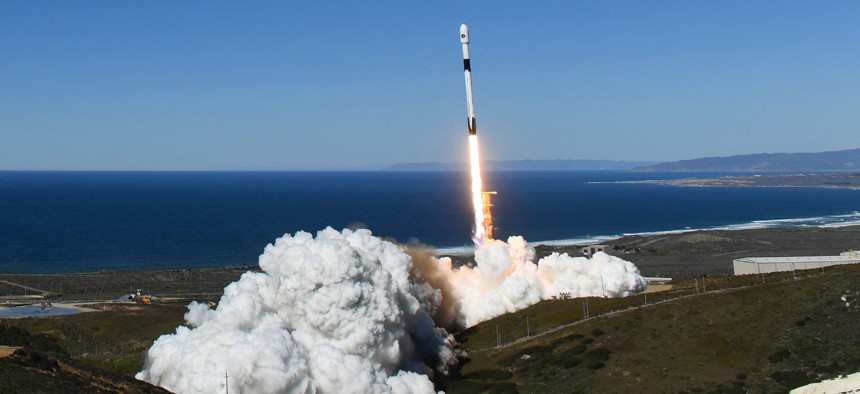New USAF space buyer eyes fixed-price contracts

A SpaceX Falcon 9 rocket with the NROL-87 spy satellite payload for the National Reconnaissance Office launches from Vandenberg U.S. Space Force Base on Feb. 2, 2022 in Lompoc, Calif. Patrick T. Fallon/AFP via Getty Images
Frank Calvelli, the assistant secretary of the Air Force for Space Acquisition and Integration, said "fixed-price contracting is not a bad approach for space things" and could help keep acquisitions on time.
The new head of military space acquisitions wants to explore doing more fixed-price contracting in hopes of keeping costs down and programs on schedule.
Frank Calvelli, the new assistant secretary of the Air Force for Space Acquisition and Integration, said "fixed-price contracting is not a bad approach for space things" and that "the worst thing you want to be is a cost-plus program inside a factory that has everything going through a fixed price because you will end up paying the bills you end up being late and you will end up behind schedule."
It's one of many approaches that Calvelli plans to bring to military space acquisitions from the National Reconnaissance Office, where he served as the principal deputy director and deputy acquisition executive.
"They've gotten really good over the last few years of really pushing for cost realism and schedule realism in their competitive [requests for proposals]. And one of the biggest challenges we have today is when we get an RFP that we award that's not executable, and that ends up causing re-baselining and…slows things up," Calvelli said during a virtual Mitchell Institute event on June 24.
"So they've gotten really good at driving costs and schedule realism and I'm gonna probably borrow those techniques."
Calvelli added that while additional or unexpected costs weren't totally avoidable, companies bidding on space contracts should take factors such as supply chain and inflation into account when bidding instead of offering the lowest possible rate.
NASA Administrator Bill Nelson,told senators in May that cost-plus contracts were a "plague" on the agency's major projects which have suffered from cost overruns.
"We have been moving to the fixed price where we can under procurement law," Nelson told the Senate Appropriations Subcommittee on Commerce, Justice and Science and Related Agencies on May 3. "In those that we can't do cost-plus, we are moving to really crack down on them."
Calvelli made his intentions to improve space acquisitions known during his Senate confirmation hearing, saying a "culture of a program management discipline" could help the Space Force "to go a little bit faster."
On Friday, Calvelli stressed that he was not against cost-plus contracts but that fixed-price helped speed acquisitions along.
"We want to go fast, which means if we're smart, we use existing technology where we can, and take a page out of [the Space Development Agency's] playbook, which is use what you can get and go off and build on to your centers," Calvelli said. "And so when you start using existing technology capabilities and you want to go fast, fixed price helps in that as opposed to cost plus."
Calvelli added that long development cycles spanning five to seven years make it difficult to refresh technology.
"You get these things up there and they last a long time, which is awesome. But, you know, the technology's changed so quickly on the ground if you do more smaller systems with shorter design lives, as well, because launch has become so much more affordable...then you can take more advantage of technology faster."
Calvelli added that he was also eyeing NRO techniques around system engineering, cloud computing, mission frameworks, and mission applications, while also noting that he wanted to better sync space and ground systems.
"We seem to have a disconnect with space and ground systems where we'll launch something but the ground is just not ready yet or user terminals [are] just not ready yet," he said, adding that the priority is "to ensure that the space and ground systems come together as an integrated system so that when we launch the systems, we can take full advantage of them."
NEXT STORY: The Pentagon's plan for 'responsible AI'






